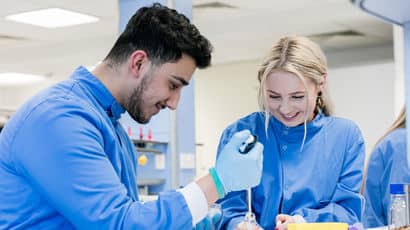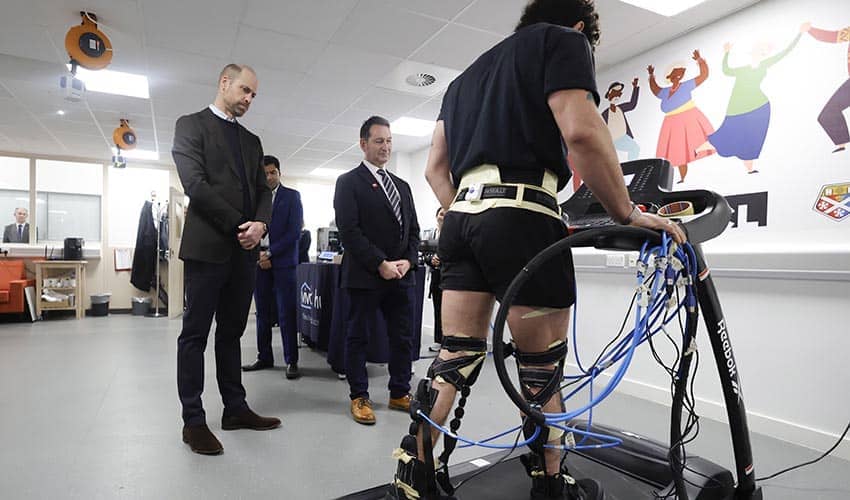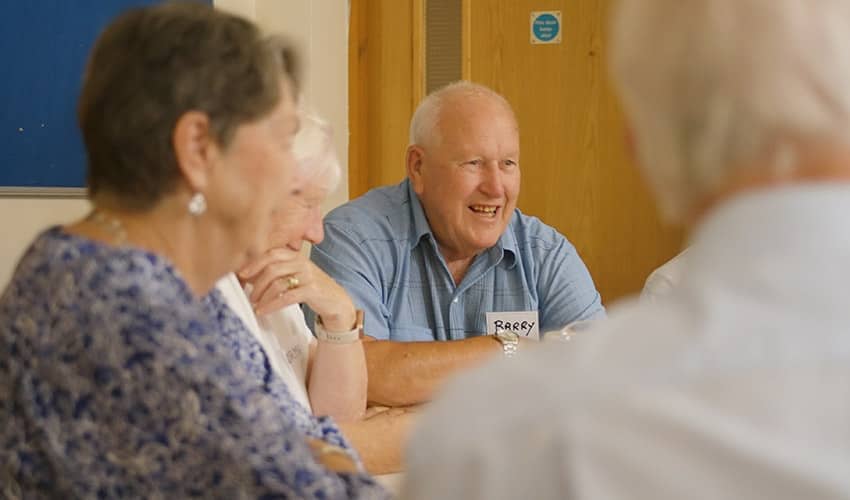
We're creating tomorrow, today. RISE
At UWE Bristol, our unique multi-disciplined, system-led approach to research, innovation, skills, enterprise and ethical practices drive societal improvements, transforming futures for the better.
Collaborating with industry, public sector bodies and communities, we’re redefining horizons and challenging conventions to impact lives positively.
Using big data, AI, augmented and virtual reality, business, research and creative thinking, our highly collaborative teams power the future workforce, drive economic growth and prosperity, shape our communities’ health and sustainability, and create a more just and sustainable future for all.
RISE with us.
Research
World-class thinking that solves real world problems.
Innovation
Not just ideas — solutions that rewrite the rules.
Skills
Upskilling today to build tomorrow's workforce.
Enterprise
Enterprise that fuels progress. Business that drives change.
RISE beacons
Shaping integrated healthcare
We’re driving innovation in health and social care education, workforce and technology.
Harnessing creativity and technology
We're working with industry and the public sector to develop skills, talent, and innovation for the future economy.
Enriching culture, place and community
We collaborate with national policymakers, local authorities, educators and industry to improve public spaces, infrastructure, and communities.
Securing a green, resilient future
Tackling global challenges by promoting social justice, empowering communities and protecting the environment.
Research and External Engagement (REE) blog
Keep up-to-date with news about our innovative research, Business Services, Degree Apprenticeships, Professional Development, Graduate Talent and Recruitment.
-

By Professor Kieran McCartan The continued publication of the Jeffrey Epstein files highlights the complexity and impact of sexual abuse and exploitation. The files reinforce the need for an individual and collective understanding, to respond to, and prevent, child sexual abuse and exploitation. The challenge is the nature and extent of the abuse conveyed in … Continue reading "Unpacking the Epstein files: What lessons can be learned for the prevention of child sexual exploitation and abuse"
Unpacking the Epstein files: What lessons can be learned for the prevention of child sexual exploitation and abuse
-

By Boudewijn Devanicus Just before Christmas, UK Research and Innovation (UKRI) published its 2026–30 budget allocations, outlining significant changes to how it plans, manages and deploys funding, described by UKRI as the most substantial shift since its creation. Last week’s open letter from UKRI Chief Executive Ian Chapman adds helpful clarity, particularly around curiosity-driven research and alignment with national priorities. For UWE Bristol researchers, these changes affect … Continue reading "What’s changing at UKRI – and what it means for UWE "
What’s changing at UKRI – and what it means for UWE
-

In this blog, Nic Crowley, Head of Centre for Apprenticeships at UWE Bristol, reflects on the stories, successes and evolving purpose of apprenticeships at a time when skills, opportunity and innovation matter more than ever. As we approach National Apprenticeship Week (NAW) 2026, I find myself reflecting on the extraordinary impact apprenticeships continue to have on people, businesses and … Continue reading "Skills that empower: Looking ahead to National Apprenticeship Week 2026"
Skills that empower: Looking ahead to National Apprenticeship Week 2026
-

Knowledge Transfer Partnerships (KTPs) are one of the UK’s best-kept secrets in innovation, quietly transforming businesses for decades. For over 50 years, they’ve helped companies turn ideas into practical solutions with real-world impact, creating more than 14,000 projects and boosting the economy by £2.3 billion. KTPs continue to deliver not only because they provide access … Continue reading "Innovation with Impact: What is a Knowledge Transfer Partnership and Why it Drives UK Innovation"
Innovation with Impact: What is a Knowledge Transfer Partnership and Why it Drives UK Innovation
-

Dr Elizabeth Jenkinson, Associate Professor in Health Psychology at University of the West of England, has been awarded the British Psychological Society Division of Health Psychology Chair’s Mentoring Award for 2025. The award recognises Liz’s outstanding contribution to the discipline of health psychology through her long-standing commitment to mentoring early- and mid-career psychologists, academic colleagues, … Continue reading "UWE Bristol academic recognised with British Psychological Society Mentoring Award "
UWE Bristol academic recognised with British Psychological Society Mentoring Award
-

In late 2025, Dr Tariq Umar, from the School of Architecture and Environment at UWE Bristol, contributed his expertise and experience to two major British Academy programmes aimed at supporting Early Career Researchers (ECRs) across the UK. Across both events – Navigating academic culture and career progression (Newcastle, 28 November 2025) and Setbacks to success: … Continue reading "Championing research careers: Dr Tariq Umar represents UWE Bristol at two key British Academy events"
Championing research careers: Dr Tariq Umar represents UWE Bristol at two key British Academy events
-

As the realities of climate change intensify, it is increasingly clear that resilience must extend beyond infrastructure and economics. Cultural heritage, however, remains one of the most overlooked elements in this equation. UWE Bristol researchers and on-the-ground local professionals and heritage organisations in Yemen are working to change that. The project offers a stark example … Continue reading "Heritage and climate resilience: global lessons from Yemen"
Heritage and climate resilience: global lessons from Yemen
-

As 2025 draws to an end, it’s time to reflect on our achievements this year. Plenty has already been said and written about the 2025 Project Zulu (PZ) choir tour, but I would like to reiterate here how proud I am of the choir, their teachers, their support teams and the UWE Bristol PZ team for pulling off such a … Continue reading "Ben Knight Reflects on Project Zulu’s Big Year and Looks Ahead to 2026 "
Ben Knight Reflects on Project Zulu’s Big Year and Looks Ahead to 2026
You may also be interested in

Business and community partners
Services we offer to businesses, information for schools and colleges, how you can support UWE Bristol, community engagement and hiring our spaces for an event.

Research centres and groups
Browse UWE Bristol's portfolio of research areas, expertise, staff and publications.

Postgraduate research study
Postgraduate research at UWE Bristol offers you the opportunity to contribute to our leading edge research and work alongside our international experts.

University Enterprise Zone
Providing opportunities and outstanding spaces for a thriving community of start ups, fast-growth businesses, graduate entrepreneurs and cooperative research.






